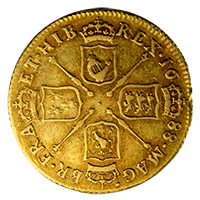King James II was born in 1633, the second son of Charles I and Henrietta Maria. He came to the throne relatively late in his life, at the age of 51, after the death of his older brother, King Charles II.
Life Before the Throne
James grew up alongside his brother, Charles II, so the two shared the same childhood which was full of political upheaval. He was the opposite of his charming and fun-spirited brother, however. He had a much harder, colder personality than Charles. He was tactless, inept and guilty of many faults.
His incompetence led to the Glorious Revolution of 1688, which entirely changed the nature of England’s monarchy forever and saw the king driven away from his own kingdom to live in exile.
He was undoubtedly brave, though, and was successful before he came to the throne. He became Lord High Admiral, he strengthened the Navy and led two sea battles against the Dutch.
So how did the 51-year old James find himself becoming king?
His brother, Charles II, was restored to the throne in 1660, after a period in which England was led as a republic under Oliver Cromwell, then his son, Richard Cromwell. Charles had a great number of illegitimate children but none with his wife, meaning he didn’t manage to produce an heir. So, when Charles died in 1685, it was James who took up the responsibility of being king.
It didn’t take long after he came to the throne for trouble to begin.
The Two King James IIs
King James II’s first troublesome issue came in the form of James, Duke of Monmouth. He was Charles’s eldest illegitimate child and tried to force his claim to the throne. In reality, the only claim he had was that he was Protestant but that was enough to win him some support. He was actually crowned King James II, meaning that for a few weeks, there were two King James IIs of England.
The Monmouth Rebellion, as it was known, was squashed at the Battle of Sedgemoor in Somerset. Interestingly, this was the last battle ever fought between two English people in England.
The punishments that were divvied out to those who’d supported the rebellion, including the beheading of Monmouth, did nothing to bolster the king’s sorry reputation.
Conflict with Parliament
Like the other Stuart monarchs before him, James had a rocky relationship with Parliament. Parliament wasn’t happy with many of his actions, including the punishments received by Monmouth’s supporters. Their main source of tension, though, was once again religion.
James wanted fair treatment for both Catholic and Protestant dissenters. He also filled all the positions of power with Catholics in an attempt to reconvert the country back to Catholicism. It was an unpopular move and James was left with little support. Even Catholics had become alienated as they didn’t trust him. In 1687, the king dissolved Parliament because of its hostility towards him.
The Glorious Revolution
Though you could argue that James had set in motion his downfall long before, the real turning point was the birth of the king’s son. In 1688, James’s second wife, Mary of Modena, gave birth to James Francis Edward, who the Protestant nobles feared would become the next Catholic king.
They circulated rumours that the young James wasn’t the couple’s baby, that he’d been smuggled in in a warming pan. This was all the excuse they needed to reach out to James’s Protestant daughter, Mary, who’d been the heir to the throne until James Francis Edward’s birth, and her husband, William of Orange. They appealed to the pair to come to England and take the throne for themselves.
Mary and William sailed to England flanked by an army, landing in Devon in November 1688. King James, on the other hand, found himself deserted by those he’d alienated. He had little choice but to flee to France, leaving Mary and William to become the king and queen in what became known as the Glorious Revolution.
James II in Exile
But that wasn’t the end of James II, not quite.
He, Mary and their son lived in exile in France in the Château de Saint-Germain-en-Laye and, in March 1689, James travelled back to Ireland with the help of the French. In 1690, however, he was defeated by William’s army at the Battle of the Boyne.
James went back to France, where he died in September 1701. Uniquely, he was the only English monarch to die in exile.


